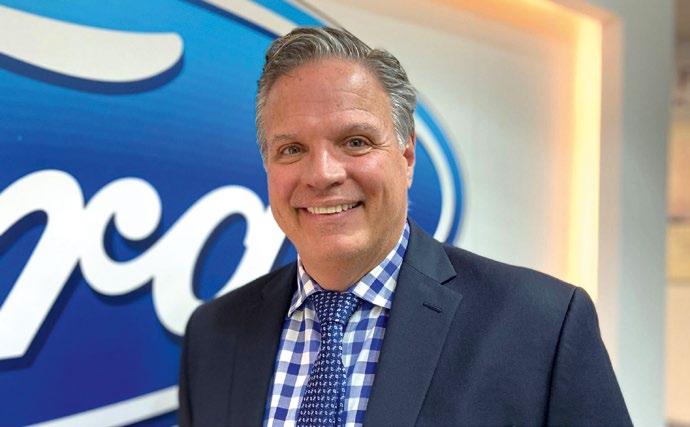‘Recharge yourself and your car’ That’s Shell’s plan for its new EV-only forecourts and their charge-time-friendly facilities. John Evans finds out more PHOTOGRAPHY OLGUN KORDAL display board directs you to an available EV charging bay, one of up to 10 150kW ultra-rapid chargers occupying the main forecourt and protected from the elements by a pair of opposing, stylish-looking canopies fitted with solar panels. Nearby, a Little Waitrose convenience store, a Costa, free wi-fi, a parcel collection point and, holy of holies, clean lavatories. All this and not a petrol or a diesel pump in sight. Welcome to the forecourt of the future, as conceived by Shell. No marketer’s pipe dream, the company’s first all-EV charging station opens for business early next year in Fulham, London. “We call it Project Evelyn – an energy hub where you can recharge yourself and recharge your car,” says Bernie Williamson, general retail manager at Shell UK. “Exactly when we’ll start rolling out more sites
A
on the same lines is hard to say but Shell supports the ban on internalcombustion-engined vehicles and aims to be the leading rapid charger on the go.” Shell unveiled its first 50kW EV rapid-charging post, capable of recharging a battery from zero to 80% in 30 minutes, at its Holloway Road service station in north London in October 2017. Nine more followed in quick succession. By 2021, it plans to have a combination of 200 rapid (50kW) and ultra-rapid (150kW) chargers on forecourts located on major routes across the UK. Going forward, all of its new or upgraded chargers will be ultra-rapid. These rapid and ultra-rapid chargers are in addition to the large network of fast chargers available on local roads that are managed by Shell’s NewMotion charging division. Meanwhile, by the end of 2020, the company plans to have three 350kW chargers in operation, eclipsing
AFTER Tesla’s 250kW V3 Superchargers. As they do now, all of Shell’s chargers will dispense renewable electricity. So that’s the car’s battery taken care of, but while you’re waiting, you can recharge yourself with a ‘Jamie Oliver deli by Shell’ sarnie. The upmarket snack range will feature in Shell’s Fulham EV-only service station, highlighting that the forecourt of tomorrow is expected to be more than simply a recharging destination. “Shell is strong in the convenience
sector,” says Williamson. “One in three of our transactions is shopping, not buying fuel. While they wait for their car to recharge, we expect customers to want to catch up with their shopping, have a coffee or, where space allows, do something like click and collect. We call it ‘taking care of yourself and your car’. “The coronavirus epidemic has proved to be a dress rehearsal for how we see things evolving, with people increasingly keen to do as many
B P C H A R G E M A S T E R T E S T S WAT E R W I T H M & S Shell isn’t the only energy retailer looking to help customers make more productive use of their EV’s charging time. In August, BP Chargemaster launched a partnership with Marks & Spencer when it unveiled three 50kW rapid chargers at the company’s Maidstone store, off junction seven of the M20 in Kent. The chargers dispense 100% renewable electricity and feature contactless payment terminals and connectors for all capable electric vehicles. They are part of BP Chargemaster’s Polar public charging
50 AUTOCAR.COM.PH MAY 2021
network and are accessible with a Polar Plus membership RFID card or the Polar Instant PAYG app. The new service is the first of a five-store trial. Matteo de Renzi, CEO of BP Chargemaster, said: “As well as serving existing Marks & Spencer customers who already or will soon drive electric vehicles, we expect the rapid chargers to bring new customers to these stores, as they are in the right locations to support those driving along the strategic road network and provide a great opportunity for a brief stop.”
BP Chargemaster and M&S teamed up in August and plan to run a five-store trial


















